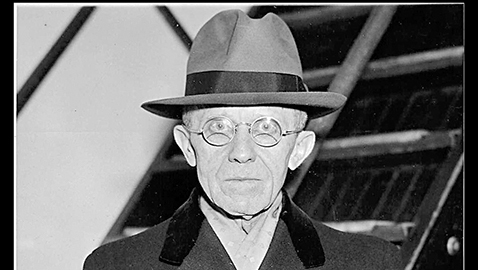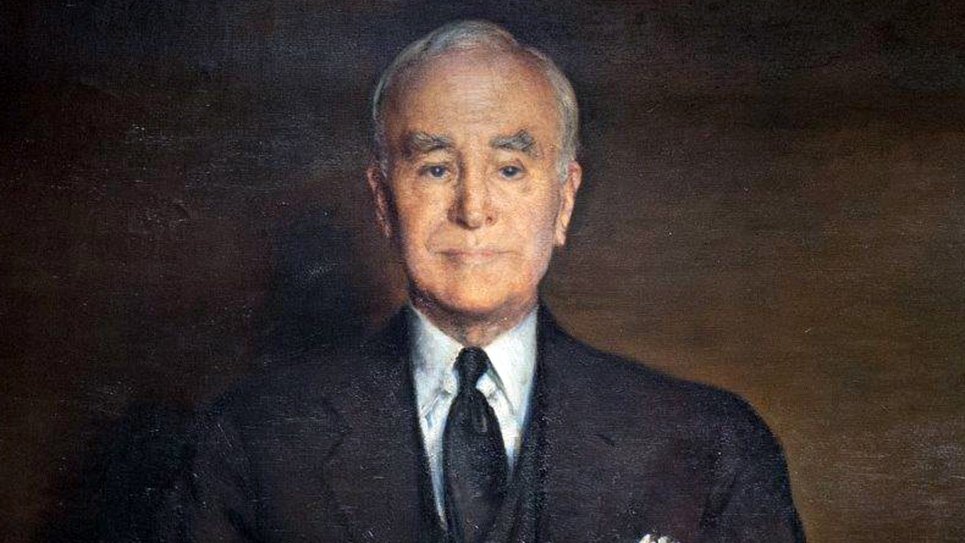Tennesseans and the New Deal
By Ray Hill
Few people today can imagine the suffering during the Great Depression; the Depression brought hardship, hunger and homelessness to millions of people throughout the United States. At the same time, many Americans were plagued by the terrible dust storms caused by a drought, accompanied by winds, that lasted for seven years. The drought left much of America’s once-fertile farmland dry, cracked, and barren. The winds carried the dust, literally choking people. One woman recalled after washing the dishes, the dust would accumulate inside the cupboards and they would have to be washed yet again before the next meal. The drought made life even more difficult in Texas, Colorado, New Mexico, Nebraska, Kansas, North and South Dakota, as well as Oklahoma. It was yet another burden folks had to carry along with the Great Depression.
Joblessness was rampant and there were no social safety nets at the time; there was no welfare, no food stamps, no Social Security. In fact, most homes didn’t have electricity. People being forced out of their homes was commonplace. Perhaps the most poignant story I recall about the Depression and the desperation it wrought was that told by Ohio U. S. senator Stephen M. Young who wrote in his memoir about a young boy whose family was so hungry they killed and ate the boy’s pet rabbit, which so upset and depressed the little fellow he hung himself. Perhaps the scarcest commodity during the Depression was hope, but millions of Americans found cause for hope came in the form of Franklin Delano Roosevelt. The suffering had been intense during the administration of the austere Herbert Hoover. The “Great Engineer” had been elected overwhelmingly in 1928 and was summarily ejected from the White House by a great majority of Americans who desperately wanted homes, food, and jobs.
The election of Franklin D. Roosevelt followed twelve years of Republican rule and the newly elected president had been accompanied to Washington by a majority of his Democratic Party in Congress. Millions of Democrats across the country petitioned their Members of Congress for help in securing jobs. It was no different in Tennessee; the Volunteer State’s senior United States senator, Kenneth D. McKellar, had served in the Senate since 1917 and was the first person ever to be elected to the U. S. Senate from Tennessee by the people. McKellar’s junior colleague, Cordell Hull, had been in the Senate for only a couple of years when he was nominated by President Roosevelt to serve as Secretary of State. Nathan L. Bachman, a former justice of the Tennessee Supreme Court, was appointed by Governor Hill McAlister, to serve until the 1934 special election. It was Senator McKellar who had the most to say about federal jobs in the myriad of alphabet agencies that sprang up throughout Franklin Roosevelt’s New Deal, yet Cordell Hull’s State Department served as a popular destination for would-be diplomats. Senator McKellar happily promoted the aspirations of thousands of Tennesseans for work, as well as supported innumerable projects, which provided work for folks back home. McKellar was especially delighted by the creation of the Tennessee Valley Authority, which gave relief from flooding, as well as jobs and affordable electricity for hundreds of thousands of people in Tennessee.
A few of the folks who ended up in the foreign service of the government of the United States were Edward Albright, John Draper Erwin, and Ashley Sowell. The three were very different men in many respects, but all three had a few things in common. All of them were newspapermen by trade and all three were Democrats.
Edward Albright was from Sumner County lived in Gallatin. Albright also dabbled in politics and had helped to manage then-congressman K. D. McKellar’s first bid for the Democratic nomination for the U. S. Senate in 1915. When McKellar first entered the Senate, his first secretary was Edward Albright.
Albright held a law degree but owned and published the Sumner County News. Albright had run an ill-fated race for Congress to represent Tennessee’s Fourth District when Cordell Hull had left his seat in the House of Representatives to seek election to the Senate. Albright ran a distant second to J. Ridley Mitchell, a popular Circuit Court judge from Cookeville. Still, Albright had the strong support of the people who knew him best; he carried his own Sumner County with 4,045 votes to 688 votes combined for his two opponents. Edward Albright’s relationships with Kenneth McKellar and Cordell Hull proved to be enough to allow him to be named as the United States’ minister to Finland. When Albright’s appointment as minister to Finland was announced, the Knoxville Journal noted he was “one of the best known weekly newspaper editors in the state.” Having been a strong supporter and resident of Cordell Hull’s Fourth District it was believed the Secretary of State “wished to recognize his friend with a suitable diplomatic appointment,” which also pleased Senator McKellar to no end. According to the Nashville Banner, Edward Albright left for his diplomatic post in Finland, in August of 1933, sailing from the United States and landing in Plymouth, Great Britain before going on to London, Paris, Berlin and then to Helsingfors. Evidently the bachelor ambassador was well-liked in Finland but the country’s harsh winters proved to be too much for the Tennessean, who asked to be posted to another country, preferably one with a warmer climate. Secretary Hull was sympathetic and it was announced President Roosevelt had named Edward Albright as minister to Costa Rica. Unfortunately, Edward Albright would never take up his new post.
Minister Albright was gravely ill. Evidently, Edward Albright was never told he was suffering from advanced lung cancer. Albright entered a Nashville hospital May 24, 1937 after feeling ill at his apartment in Gallatin and failing to improve. On May 25, 1937, the Nashville Tennessean published a succinct story saying Albright’s condition was “better” after having been admitted to Barr’s Infirmary in critical condition. The newspaper stated Albright had been under the care of a “lung specialist” while in Washington, D. C. Apparently whatever improvement Edward Albright experienced did not last long as he died that same day. An editorial in the Clarksville Leaf-Chronicle hailed Albright’s career as a journalist and diplomat. The Leaf-Chronicle was glad Albright had returned “from a far land” to die amongst his people and in Middle Tennessee where he had been born, worked and lived throughout his life.
Ashley Sowell was a newspaperman and a Middle Tennessean who also enjoyed a diplomatic career. Sowell was the son of F. C. Sowell, a well-known minister of the Church of Christ in Columbia, Tennessee. Sowell had risen from copy boy to editor and publisher of the Maury Democrat. Sowell had bought the newspaper from the heirs of Ed and Lynch Perry who had first employed him as a lad. By 1933 Sowell was petitioning Senator K. D. McKellar for help in securing a federal job. Franklin D. Roosevelt had been president for little more than a month when McKellar wrote an anxious Sowell on April 11, 1933, reassuring the publisher, “…I really feel that we will be able to get you a place.” Senator McKellar told Sowell the new administration had “not started appointing yet to any extent, but I feel sure you will be among them.” McKellar closed his letter by reminding Ashley Sowell, “You can be assured that I am going the limit for you.”
True to his word, Senator McKellar arranged for Sowell to work as the assistant to Secretary of Commerce Daniel C. Roper. McKellar, a great admirer and supporter of the late President Woodrow Wilson, had known Roper during the Wilson administration. When Roper was prodded out of the Roosevelt administration in 1939, Sowell was transferred to the State Department, headed by fellow Tennessean Cordell Hull. Ashley Sowell was assigned to Panama. Evidently Sowell never contemplated returning to Tennessee and engaging in the newspaper business as he sold the Maury Democrat in 1941. After five years in Panama, Sowell had been called back to Washington, D. C. for a conference on Pan-American affairs. Ashley Sowell returned to Panama and a month later died from bronchial pneumonia. Only 51 when he died, Ashley Sowell left behind a wife, daughter, and grandson, as well as his father, a brother, and six sisters.
John Draper Erwin, was yet another journalist who retained a lively interest in politics and landed in a diplomatic career. Erwin was born in Kentucky but attended the McCallie School in Chattanooga. Erwin was a reporter for the Chattanooga News in 1908 and when John Knight Shields was elected to the United States Senate in 1913, John Draper Erwin went to Washington, D. C. as the secretary for the new senator. That particular arrangement did not last long; John K. Shields could be quite cantankerous and whether Erwin and the senator had a falling out is not known. What is known is Erwin left the office of Senator Shields to serve as the secretary to Tennessee’s senior senator, Luke Lea. Lea was charming whereas Shields was curmudgeonly, and Luke Lea also just happened to be in the newspaper business, owning the Nashville Tennessean. Despite his charm, Luke Lea could not help himself and meddled in Tennessee politics continually, earning and making enemies all along the way. Tennessee Democrats were bitterly divided and by 1915 called a primary for Lea’s seat more than a year in advance of the 1916 general election. Although Erwin worked diligently for his employer, he apparently also managed not to offend the winner, Congressman K. D. McKellar. Erwin went back to the newspaper business and helped to uncover the Teapot Dome scandal during the 1920s. Erwin was working as the Washington correspondent for the New York Evening World, the Tennessean, and the Memphis Commercial Appeal until 1937. That same year Erwin became the U. S. Minister to Honduras.
John Draper Erwin was promoted to America’s “Ambassador Extraordinary and Plenipotentiary on March 27, 1943. Ambassador Erwin resigned in 1947 and his resignation caused some political trouble back home, as Senator McKellar strongly suspected his friend was being forced out of office due to the senator’s fierce opposition to the nomination of David E. Lilienthal to head the Atomic Energy Commission. The State Department meekly announced Erwin’s recall was due to “a general overhaul of the diplomatic service under the new” Secretary of State, George Marshall. Assistant Secretary of State Dean Acheson wrote McKellar to say the “17 changes of chiefs of mission” were certainly “no reflection upon his (Erwin’s) record.” It is highly unlikely Acheson’s letter mollified the peppery McKellar.
Erwin returned home to the United States and worked in the State Department until 1951 when Senator McKellar repeatedly nudged President Harry Truman until the Man from Missouri reappointed John Draper Erwin as Ambassador to Honduras on February 1 of that year. Erwin remained at his post until February 28, 1954 when President Dwight D. Eisenhower replaced him. Once again, John Draper Erwin returned home to work in the State Department. In 1956, John Draper Erwin was seventy-three years old and had served for twenty years in the State Department. Erwin retired and remained in Washington, D. C. Erwin’s wife of 59 years, Rebecca, died in 1976 and the ninety-three year-old former ambassador kept up his usual routine of having breakfast at the National Press Club, where he was a member. Arriving each morning at precisely 8:00 a.m., John Draper Erwin would order soft-boiled eggs and coffee while he read a wide variety of newspapers. Ambassador Erwin had been a member of the National Press Club for 67 years and arrived daily until a few months before his death at age ninety-nine in 1983.
Edward Albright, Ashley Sowell, and John Draper Erwin had much in common, not the least of which was a commitment to service and that is qualification enough for a brief remembrance.







